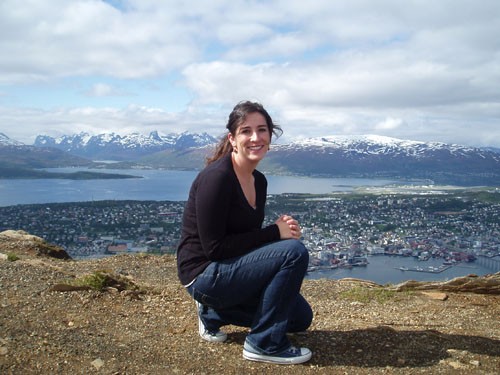Since 1992, the UA’s program BRAVO! (Biomedical Research Abroad: Vistas Open) has made it possible for UA students to do research overseas and collaborate with scientists in various countries.
Nursing and Spanish senior Elizabeth Crane is currently doing research in Tromso, Norway.
“”The best part about doing research abroad is seeing the similarities and differences between the ways things are done at home in the U.S. and in a foreign place. It is interesting to compare the two, because while there are many differences in the way tasks are accomplished, all the work is towards the same common goal,”” Crane said.
Crane is researching how health care systems affect women diagnosed with breast cancer.
Crane said she is comparing the Norwegian health care system to the United States’ to evaluate elements within both systems, examining the beneficial aspects as well as anything that might hinder the treatment process.
Though research abroad may help Crane achieve her goal of becoming a registered nurse, as well as allowing her to experience a different culture, these opportunities did not fall into her lap.
According to Carol Bender, director of BRAVO!, the application process is very involved and teaches students what it means to be a scientist.
Students must have six months of related research experience, and they must write a proposal and defend it before a panel.
After completing the process, Biochemistry senior Troy Comi was able to earn funding for his research.
“”The application is long and difficult, but it is a great opportunity to practice writing for grants and asking for support from funding agencies. The selection committee gives you plenty of time to address concerns and the program has a fairly high acceptance rate,”” said Comi, who is researching new methods of diabetic systems in Stockholm, Sweden this summer.
Crane said jumping through all the hoops was worth it.
“”When you think about the fact that, if you are accepted, they will pay for the whole trip, it definitely puts things into perspective and makes all of the work worth it,”” said Crane.
According to its website, BRAVO! is able to fund students with grants from the NIH National Center on Minority Health and Health Disparities at the National Institutes of Health and The Howard Hughes Medical Institute.
“”We pay for pretty much everything. It’s a very generous package,”” Bender said.
Bender said they sent 10 students abroad this summer. They only send one to two students during the academic year. It’s difficult to schedule overseas research in addition to science classes if a student wants to graduate in four years, Bender said.
Bender emphasized the distinction between studying abroad and researching abroad.
Microbiology senior Andrew Ancharski agrees that there is a big difference.
Ancharski, who is currently in Peru, is researching a parasite that causes Chagas disease, which is spread by insects.
“”Studying abroad seems more like a vacation to me. Doing research abroad is much more challenging and it yields results that will contribute to your future,”” Ancharski said.
Bender said every student that applies to the program has a mentor.
“”You need the people here to help you make the contacts abroad and help you through the process,”” Bender said.
Ancharski received help from a UA professor and lab manager, Crane’s honors thesis advisor aided her in setting up work with an institution abroad, and Comi’s mentor, Craig Aspinwall, introduced him to the idea of doing work overseas.
“”He has done some research and spent time during his sabbatical at the Rolf Luft Center.
He was able to introduce me to everyone overseas that made my stay here possible,”” said Comi, referring to Aspinwall’s help.
Comi hopes to continue his research in graduate school and eventually conduct research of his own in an academic setting.
“”The best part of the research is access to the facilities where I work. The Rolf Luft Center is one of the largest diabetes research centers in Europe. It’s by far the nicest lab I’ve ever worked in. I have also had the opportunity to work closely with experts in molecular cloning and imaging, and they were able to teach me many new techniques, as well as new tricks for techniques I already knew,”” said Comi.
Comi recommends this experience to other UA students.
“”Not only was I able to spend my summer productively in the lab, I also experienced a different culture, a different laboratory environment and a new city. I learned about local culture and history, tried new food and met a lot of great people,”” Comi said.
Crane also urges UA students to participate in BRAVO!.
“”If you are a motivated student looking for an opportunity to get research experience in a wonderful, unique setting abroad, you should definitely consider applying for the BRAVO! program,”” said Crane.
Ancharski agrees with Crane and Comi, and added that there needs to be more information available about these types of opportunities to students.
The downside of researching abroad for Crane and Ancharski included being away from friends and family.
“”In Tromso, all of the students go on vacation during the summer, so there are very few people my age and everyone who I work with is older,”” Crane said.
Comi said one of his biggest issues has been the sun.
“”Being so far north, Stockholm has sunlight for technically 18 hours, although it really never gets dark. This makes going to bed and staying asleep very difficult,”” Comi said.
Ancharski has had trouble with language barriers.
“”A few people speak English in the labs, but not everyone,”” Ancharski said.
Although these negative aspects make the trip a bit more challenging, these students feel like the valuable experience makes it worth it.
“”I have learned countless things while being here, all of which will help me with my future goals in education,”” Ancharski said.
To learn more about eligibility and other details of BRAVO!, go to https://ubrp.arizona.edu/bravo/.









